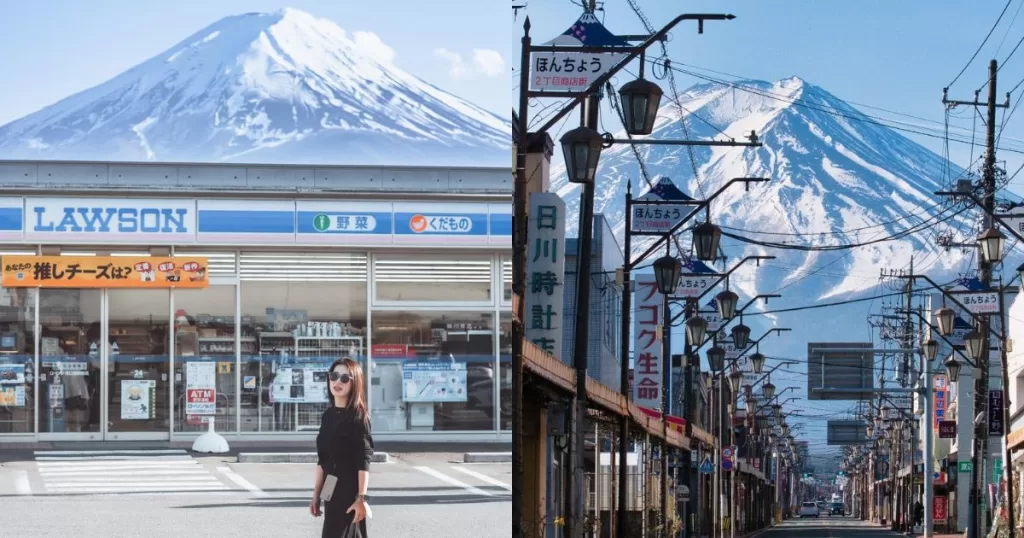Japan Erects Massive Barrier to Block Iconic Mount Fuji View from Unruly Tourists
In an unprecedented move to combat the surge of misbehaving foreign tourists, the Japanese town of Fujikawaguchiko has announced plans to install a gigantic black mesh net, measuring 2.5 meters high and 20 meters long, to obstruct the picturesque view of Mount Fuji from a popular photo spot.
The construction of this barrier, set to begin as early as next week, comes as a last resort after the town’s efforts to curb the influx of disrespectful visitors through traffic signs and security guard warnings proved ineffective.

The viewpoint in question, located near a Lawson convenience store, has gained immense popularity on social media due to the unique juxtaposition of Japan’s highest mountain against the backdrop of the ubiquitous retail chain.
However, the town official, who wished to remain anonymous, stated that the mostly non-Japanese tourists have been overcrowding the pavement, leaving litter behind, and disregarding traffic regulations.
The situation has escalated to the point where tourists have been caught parking without permission and even climbing on the roof of a nearby dental clinic to capture the perfect shot. The town’s decision to install the barrier is not only aimed at managing the unruly crowds but also to protect the clinic from further disturbances.
Fujikawaguchiko’s predicament is not an isolated incident, as Japan has been grappling with the challenges of overtourism since the lifting of pandemic-era border restrictions. In March 2024, the country recorded a staggering 3 million monthly visitors, the highest ever. While the government has been actively promoting tourism, some locals have expressed concerns about the impact on their communities.
In Kyoto, for example, residents of the geisha district have taken matters into their own hands by banning visitors from small private alleys in 2025 to prevent harassment of the immaculately dressed geisha by snap-happy tourists. Similarly, hikers using the most popular route to climb Mount Fuji will be charged a fee of US$13 (S$17.70) each starting this summer, with numbers capped to ease congestion.
As Japan continues to attract record numbers of tourists, the country faces the challenge of balancing economic benefits with the preservation of its cultural heritage and the well-being of its residents. The installation of the barrier in Fujikawaguchiko serves as a stark reminder of the need for responsible tourism and the importance of respecting local customs and regulations.
Here are some comments from users on the topic:
- “I was there a few weeks ago and between people nearly being hit by cars and buses (completely ignoring the police) and those a bit further along standing on the middle of a railway line to take a photo while the train was coming it was madness. Meanwhile the cafe with the perfect view of Fuji was empty.”
- “Went on vacation within Japan recently and the area was flooded with Chinese tourists. They were in areas they weren’t supposed to be, getting into historical foot baths that are off limits, damn near shoulder checking me at the Ryokan, etc. They may show up in tour groups, but they diverge from those pretty quickly.”
- “A lot of this has to do with the weak yen and strong dollar. It’s regrettable that quite often the sh*tty white tourists are just assumed to be Americans.”
- “On my recent trip (first time) I observed and interacted with many tourists. Without fail, the Europeans were rude as hell. Glaring at us, making no effort to follow the local customs (like not talking loudly on trains) etc..”
- “As a westerner, I am not sure that we truly have a grasp for how serious the Asian community is about taking pictures, with proper camera equipment, the poses, the angles and the sheer quantity of them. I applaud their enthusiasm, but unfortunately, they didn’t seem to care when they were inconveniencing others.”
It is essential to be aware of the challenges faced by popular tourist destinations and the importance of being a responsible visitor. By respecting local customs, regulations, and the environment, expatriates can contribute to the preservation of Japan’s cultural heritage and maintain positive relationships with their host communities.
Source: Straits Times